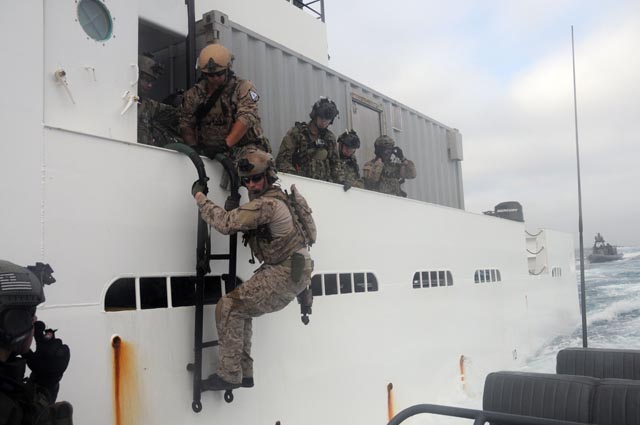TRIPOLI, Libya — A militia commander controlling Libya’s oil terminals denounced the United States for seizing a tanker that his militia was using to try to export oil in defiance of the country’s central government, saying Tuesday that Washington was siding with Tripoli against the aspirations in the eastern half of the country for greater autonomy.
Ibrahim Jedran is part of a movement demanding autonomy for eastern Libya and last summer his militia took over Libya’s oil facilities in the east. As a result, the country’s exports of its biggest revenue earner have slowed to a trickle. This month, Jedran’s militia loaded a tanker full of more than $30 million-worth of oil at a Mediterranean port it controls and tried to export the oil for sale for the east’s coffers.
On Sunday night, US Navy SEAL commandos captured the tanker, Morning Glory, as it was anchored off the Mediterranean island of Cyprus. The US Navy is now escorting the vessel back to Libya to hand over to the central government.
The tanker episode illustrated the extreme weakness of Libya’s government since the 2011 ouster and death of longtime strongman Moammar Gadhafi. Authorities in Tripoli have almost no authority around the country, the army and police are in disarray, and multiple militias around the country have filled the void, claiming their own power. At the same time, the autonomy movement in the east — a region historically known as Cyrenaica — has gained strength, building on local resentment over years of discrimination and marginalisation of the area by Tripoli.
Speaking in a televised statement aired on his private TV network, the militia commander Jedran said Washington was aligning with the wrong side in the dispute of Libya’s regions. He said the central authorities in Tripoli are dominated by Islamists, who hold sway in parliament, and ignore the aspirations of the east.
“The free world should stand next to the side of truth,” Jedran said. “But today we find a super power declaring piracy.”
Jedran warned the US against handing the tanker and three eastern Libyans on board over to “the criminal militia that rules Tripoli”, adding that “such a dangerous measure would lead to a civil war”.
It is not known who the oil was to be sold to or who owns the tanker. Jedran in his comments said it is owned by the Libyan Company for Oil and Gas, a parallel body created by the autonomy movement in the east to run the oil industry in its area. The Cyrenaica autonomy movement has created a number of administrative bodies in the east that are not recognised by Tripoli.
Jedran claims to have around 20,000 fighters under his command, originally rebel fighters who participated in the eight-month uprising that toppled Gadhafi. After the collapse of Gadhafi’s rule, the fighters were tasked with guarding oil terminals in the east, where most of Libya’s oil infrastructure is located. After long accusing the government of corruption and embezzlement, he moved his forces to take over the terminals, virtually shutting down the country’s previous production of 1.4 billion barrels a day. He demands investigation into corruption allegations in oil sales, fair distribution of oil revenues among the country’s three regions — Tripoli, Cyrenaica and the southern region known as Fezzan — and a return to the 1951 constitution, in which the country was a federation where regions had considerable autonomy.
During the oil tanker crisis, parliament tasked western-based militias to launch an offensive to take back the oil facilities. After some initial clashes with Jedran’s forces, the offensive has been put on hold — but the violence deepened polarisation.
Jedran benefits from the increasing sense among the eastern population that authorities are unable to bring stability to the country, with killings taking place almost on a daily basis in eastern cities. Many militias in the east have Islamic extremist ideologies, and are suspected in frequent attacks on police and the military.
On Tuesday, a slain Christian Iraqi professor was found inside his car in a central city of Sirte, according to state news agency.
The agency LANA reported that security forces found the body of Adison Karkha, a 54-year-old medical school professor. The agency added that motives behind the killing are unknown.
